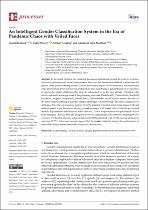 ResearchSpace
ResearchSpace
An intelligent gender classification system in the era of pandemic chaos with veiled faces
JavaScript is disabled for your browser. Some features of this site may not work without it.
- ResearchSpace
- →
- Research Publications/Outputs
- →
- Conference Publications
- →
- View Item
| dc.contributor.author |
Rasheed, J

|
|
| dc.contributor.author |
Waziry, S

|
|
| dc.contributor.author |
Alsubai, S

|
|
| dc.contributor.author |
Abu-Mahfouz, Adnan MI

|
|
| dc.date.accessioned | 2023-02-26T08:32:48Z | |
| dc.date.available | 2023-02-26T08:32:48Z | |
| dc.date.issued | 2022-07 | |
| dc.identifier.citation | Rasheed, J., Waziry, S., Alsubai, S. & Abu-Mahfouz, A.M. 2022. An intelligent gender classification system in the era of pandemic chaos with veiled faces. <i>Processes, 10(7).</i> http://hdl.handle.net/10204/12619 | en_ZA |
| dc.identifier.issn | 2227-9717 | |
| dc.identifier.uri | https://doi.org/10.3390/pr10071427 | |
| dc.identifier.uri | http://hdl.handle.net/10204/12619 | |
| dc.description.abstract | In the world of chaos, the pandemic has driven individuals around the globe to wear face masks for preventing the virus’s transmission, however, this has made it difficult to determine the gender of the person wearing a mask. Gender information is part of soft biometrics, which provides extra information about a person’s identification, thus, identifying a gender based on a veiled face is among the urgent challenges that must be advocated for in the next decade. Therefore, this study exploited various pre-trained deep learning networks (DenseNet121, DenseNet169, ResNet50, ResNet101, Xception, InceptionV3, MobileNetV2, EfficientNetB0, and VGG16) to analyze the effect of the mask while identifying the gender using facial images of human beings. The study comprises two strategies. First, the experimental part involves the training of models using facial images with and without masks, while the second strategy considers images with masks only, to train the pre-trained models. Experimental results reveal that DenseNet121 and Xception networks performed well for both strategies. Besides this, the Inception network outperformed all others by attaining 98.75% accuracy for the first strategy, whereas EfficientNetB0 performed well for the second strategy by securing 97.27%. Moreover, results suggest that facemasks evidently impact the performance of state-of-the-art pre-trained networks for gender classification. | en_US |
| dc.format | Fulltext | en_US |
| dc.language.iso | en | en_US |
| dc.relation.uri | https://www.mdpi.com/2227-9717/10/7/1427 | en_US |
| dc.source | Processes, 10(7) | en_US |
| dc.subject | Deep learning | en_US |
| dc.subject | Facemasks | en_US |
| dc.subject | Facial images | en_US |
| dc.subject | Gender identification | en_US |
| dc.subject | Pre-trained networks | en_US |
| dc.title | An intelligent gender classification system in the era of pandemic chaos with veiled faces | en_US |
| dc.type | Article | en_US |
| dc.description.pages | 15 | en_US |
| dc.description.note | Copyright: © 2022 by the authors. Licensee MDPI, Basel, Switzerland. This article is an open access article distributed under the terms and conditions of the Creative Commons Attribution (CC BY) license (https://creativecommons.org/licenses/by/4.0/). | en_US |
| dc.description.cluster | Next Generation Enterprises & Institutions | en_US |
| dc.description.impactarea | EDT4IR Management | en_US |
| dc.identifier.apacitation | Rasheed, J., Waziry, S., Alsubai, S., & Abu-Mahfouz, A. M. (2022). An intelligent gender classification system in the era of pandemic chaos with veiled faces. <i>Processes, 10(7)</i>, http://hdl.handle.net/10204/12619 | en_ZA |
| dc.identifier.chicagocitation | Rasheed, J, S Waziry, S Alsubai, and Adnan MI Abu-Mahfouz "An intelligent gender classification system in the era of pandemic chaos with veiled faces." <i>Processes, 10(7)</i> (2022) http://hdl.handle.net/10204/12619 | en_ZA |
| dc.identifier.vancouvercitation | Rasheed J, Waziry S, Alsubai S, Abu-Mahfouz AM. An intelligent gender classification system in the era of pandemic chaos with veiled faces. Processes, 10(7). 2022; http://hdl.handle.net/10204/12619. | en_ZA |
| dc.identifier.ris | TY - Article AU - Rasheed, J AU - Waziry, S AU - Alsubai, S AU - Abu-Mahfouz, Adnan MI AB - In the world of chaos, the pandemic has driven individuals around the globe to wear face masks for preventing the virus’s transmission, however, this has made it difficult to determine the gender of the person wearing a mask. Gender information is part of soft biometrics, which provides extra information about a person’s identification, thus, identifying a gender based on a veiled face is among the urgent challenges that must be advocated for in the next decade. Therefore, this study exploited various pre-trained deep learning networks (DenseNet121, DenseNet169, ResNet50, ResNet101, Xception, InceptionV3, MobileNetV2, EfficientNetB0, and VGG16) to analyze the effect of the mask while identifying the gender using facial images of human beings. The study comprises two strategies. First, the experimental part involves the training of models using facial images with and without masks, while the second strategy considers images with masks only, to train the pre-trained models. Experimental results reveal that DenseNet121 and Xception networks performed well for both strategies. Besides this, the Inception network outperformed all others by attaining 98.75% accuracy for the first strategy, whereas EfficientNetB0 performed well for the second strategy by securing 97.27%. Moreover, results suggest that facemasks evidently impact the performance of state-of-the-art pre-trained networks for gender classification. DA - 2022-07 DB - ResearchSpace DP - CSIR J1 - Processes, 10(7) KW - Deep learning KW - Facemasks KW - Facial images KW - Gender identification KW - Pre-trained networks LK - https://researchspace.csir.co.za PY - 2022 SM - 2227-9717 T1 - An intelligent gender classification system in the era of pandemic chaos with veiled faces TI - An intelligent gender classification system in the era of pandemic chaos with veiled faces UR - http://hdl.handle.net/10204/12619 ER - | en_ZA |
| dc.identifier.worklist | 26409 | en_US |





